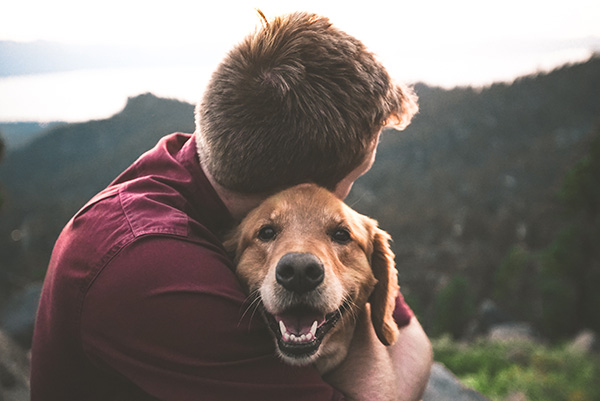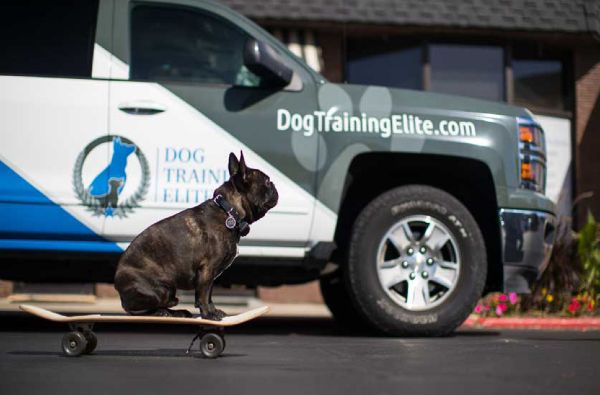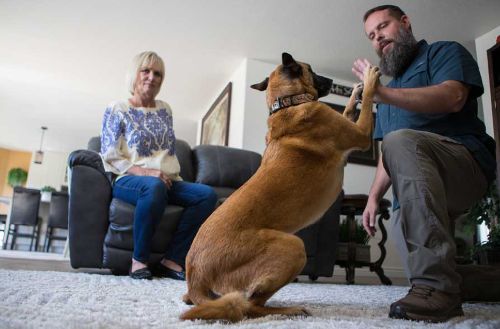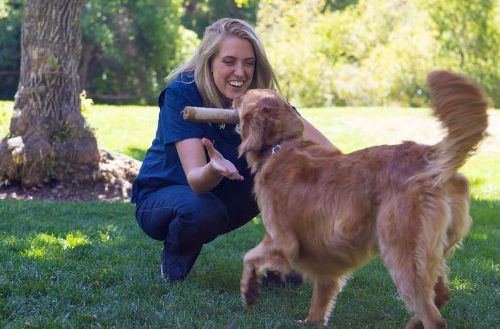Request a Free Assessment

A therapy dog is a dog who visits places like schools, hospitals and nursing homes. Therapy dog training in Boston teaches dogs to provide comfort, support, and affection to the people they meet, particularly vulnerable people like children, seniors, patients in hospitals, and so on.
Therapy dogs are not service dogs. Service dogs are trained to perform specific tasks to help a person who has a disability. This distinction is important because therapy dogs do not have the same access to public places like service dogs do. For example, service dogs can go into restaurants, but therapy dogs cannot. Therapy dogs still provide a valuable service and should receive therapy dog certification.

Not all training packages may be available at our Dog Training Elite in Boston location, please reference our pricing page for complete information on services offered.





Who Do Therapy Dogs Help?
Therapy dogs may be regular visitors to a variety of people and places, with hospitals and rehabilitation centers being among the most common. Children, in particular, respond positively to therapy dogs.
Seniors in assisted living or people with mental disabilities who live in facilities and experience feelings of isolation also see a lot of benefits from visiting with a therapy dog.
Besides providing valuable social opportunities and relieving anxiety, therapy dogs may even help lower blood pressure and heart rate in patients and the other people they visit.
Why Are Therapy Dogs Important?
Therapy dogs offer unconditional love, non-judgmental interaction, reduce stress, anxiety and loneliness, and provide an overall positive distraction to ailments. Research shows therapy dogs can have a positive effect on a patient’s mood, stress and pain levels during facility stays.
Young patients — children — seem to benefit most from working with therapy dogs. They are more motivated to participate in treatments, feel optimistic about the future, and experience an overall sense of calm when a certified therapy dog is present.
For people who may have a hard time socializing due to mental disabilities or their living situation, therapy dogs can promote social interaction within their community and help them to connect.
We help your dog become a valued companion and beloved member of the family. Read what our customers have to say and then give us a call!
Matt k did a great job. Couldn’t be happier with the whole staff.— Russ Morris
Posted September 13th 2024
I am very happy with my experience! My dog Petey is a different dog compared to who he was in the beginning. We are much happier together !— Michelle Grajeda
Posted September 12th 2024
Marcus and Patrick were fantastic. They helped us train our yellow lab puppy who had a lot of energy and sass shall we say. The trainers are very knowledgeable and helpful. Whenever we had a question about a behavior that was a challenge in between sessions with our puppy, we could just reach out and they were willing to help and guide us on what to do. Everyone was super friendly. They even accommodated my work schedule which was very helpful. Also, the group classes that we have had after the one on one sessions were a bit far for us and we were able to attend another group's classes that were closer which was really nice. It works because they use the same methods. Overall, great experience, worth the money. We highly recommend them!— Courtney Tompkins
Posted September 4th 2024
It’s been nothing but great working with the trainers here. My biggest struggle was the confidence to be able to train my dog and just a couple months later I feel much more confident already and I’m amazed how far we’ve gotten in training. All the trainers we’ve had have given us great advice that’s helped us go even farther with training. I would recommend this place in a heartbeat to anyone looking for training!— Shanna Moores
Posted July 17th 2024
The professional and courteous trainer Matt showed me exactly how to train my dog to get the results I expected. I will continue to train my dog using the skills I learned.— John Serafino
Posted July 11th 2024
Thanks so much for your help! Frankie is still a spicy girl, but I understand how to manage it, and it's restored my confidence. And she's happier as a result. Couldn't have gotten here without the insight and encouragement of Matt Fennell -- thank you, and thanks to Echo and Nova, too!— Emily green
Posted July 3rd 2024
Great people to do business with.They arrive when they say they will and the trainers are very knowledgeable and professional. They explain what the dog needs and how to train them .— Michael Bouvier
Posted May 30th 2024
When it came to sessions for training. They always made themselves available for what time worked for me!! Which was very important with my schedule. They offer group sessions in multiple locations, which made it easy to find one on a weekend to attend. All the trainers are very knowledgeable and I felt like they all love what they do. The amount of attention given in each and every session (private or group) was amazing. Definitely would recommend them to anyone who may be struggling with obedience with their friend.— Cedric Crawford
Posted May 25th 2024
Dog Training Elite of Central Massachusetts is amazing. The office staff is highly professional, organized, and kind. Whenever I call in, they are always so personable and helpful. Our trainer Matt was a godsend. We have a highly reactive german shepherd. We have tried other training facilities and private trainers that allegedly specialize in german shepherds with no results other than wasting our time and money. Within 30 minutes of meeting our dog, Matt had her full attention and obedience. We were awestruck. No one had ever been able to take control of her like that or coherently explain to us what my dog needed. In all reality, he trained us to be better pet parents and provided us with the tools and knowledge necessary to better serve our dog. We are a lot more confident in interacting with our pup and bringing her out into public. We could not be more grateful to the whole Dog Training Elite team!— Deanna Greco
Posted May 9th 2024
We and Happy have really appreciated and enjoyed the dog training at our home. The teachers have each been so helpful with plenty of techniques, strategies and answers for our questions. We are excited to pass the test and move toward having Happy become our therapy dog. All our thanks! DK & MS— Diana Kierein, LICSW
Posted May 4th 2024
From the scheduling to the personal service, the attention to detail with our dog. The way that Marcus is not only educating the dog, but educating us as a family. We can’t say enough!!!!— Cassandra Cuddy
Posted May 1st 2024
Amazing. I have a 2 year old pitbull mix that is wild. I was thinking about giving her up. Matt came in and taught me how to trainer her. He showed up every week and held us accountable, gave us homework and praised us on what we did right. Even after she bit him…… I thought there was no hope. I glad we got this training done. I am beyond grateful for him. Worth every single penny!— Sila Rosario
Posted April 30th 2024
Awesome team! Very kind and assertive. Always on time and very effective training. Very knowledgeable.— shannon guimaraes
Posted March 23rd 2024
The team at Dog Training Elite has been nothing short of amazing with my 6 month old lab puppy. We are training him to be a service dog and the week to week improvements based on Dog Training Elite’s curriculum have been immense. The team of Marcus, Jamie, and Barbara have given me and my puppy the time, guidance, and confidence to progress each step on the way to our goal. I would highly recommend Dog Training Elite for any level of training for your dog.— Matt Parr
Posted January 15th 2024
I have been very pleased with the training from Elite. The trainer has been effective and it’s making a difference for our very spirited Boston Terrier.— Thomas McIsaac
Posted January 23rd 2024
We had a wonderful experience with Dog Training Elite! Marcus is so knowledgeable and caring about the dogs he works with. He helped us train our German Shepherd rescue and the results were almost immediate. Using his techniques, our pup has become less reactive and a better listener. He also teaches some pretty cool tricks! Overall, this company is outstanding and we have enjoyed every moment!— Maya Dube
Posted January 20th 2024
Professional dog trainers who know what they are doing. So glad we chose Elite. Our rescue dog was extremely fearful and difficult to train. Marcus and Matt are dog whisperers!— Andrea Adams
Posted January 11th 2024
The training provided was exactly what we needed. Everyone we dealt with was amazing! Highly recommend Dog training Elite Boston!— Rita-Marie Auble
Posted January 4th 2024
Great results with our dog as a result of the professional training we received.— John Casey
Posted January 10th 2024

How Does a Dog Become a Therapy Dog?
If you have felt the benefits of owning a dog, you may feel inspired to help more people feel the unconditional love, joy and support your dog provides. However, having a friendly, loving personality isn’t enough for a dog to qualify as a therapy dog. Some other qualifications to consider are:
- The age of your dog. Puppies do not make good therapy animals.
- How obedient your dog is. It’s important your dog listens to you and obeys basic commands. Dogs that go through obedience training with Dog Training Elite in Boston have the perfect foundation to go onto therapy dog training, as long as they are old enough.
- How social your dog is. Your dog may be affectionate with you — but are they affectionate with strangers? Do they like to receive attention from strangers, particularly petting?
Therapy Dog Handlers
As a dog owner, it’s important to reflect on whether you would like to become a therapy dog handler as well. If you enjoy connecting with people, becoming a therapy dog handler may be a great fit. You can also choose where to volunteer to better suit your interests — if you like kids, volunteer to visit schools or children’s hospitals. If you prefer to work with older people, then sign up to visit senior living centers.
Once you’ve determined that becoming a therapy dog handler and helping your dog become a therapy dog is the right move for the two of you, you’re ready to start therapy dog training. The trainers of Dog Training Elite in Boston are experts in the behaviors needed in a therapy dog and will help you and your dog either brush up on or master behaviors such as “leave it,” “watch me,” loose-leash walking and not jumping on other people.
To help your dog become well socialized, you may consider also signing up for one of Dog Training Elite in Boston’s group obedience classes. A group class environment is also beneficial because it helps your dog learn to be obedient when there are a lot of distractions around, a crucial skill for a therapy dog.
Once you’ve completed initial training, you’re ready to apply for therapy dog certification in Boston. However, it is important to note that this certification is not the end. It’s important to stay on top of your dog’s training and continue to help them be the best therapy dog they can be.

Why do Therapy Dog Training with Dog Training Elite in Boston?
The Dog Training Elite in Boston training method stands out because of its emphasis on positive reinforcement. Dogs are never punished for bad behavior, instead they are rewarded for good behavior. This kind of training makes a huge difference in your relationship with your dog, and will make a difference in how your dog interacts with other people.
The balanced training method of Dog Training Elite in Boston fosters a dog’s naturally loving and obedient nature. Focusing on positive reinforcement and rewarding good behavior helps build a strong bond between dog and owner built on love and trust. This foundation in turn becomes a great foundation for dog and owner to become a fabulous therapy team providing an invaluable service to the community.
If you feel therapy dog certification is right for you and your dog, get started by contacting Dog Training Elite in Boston. Request your free training demo and in-home assessment today.
